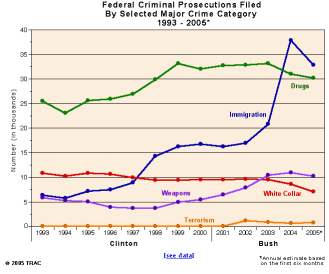White-collar criminals get more get-out-of-jail cards
In what should come as no surprise to anyone playing "find the Brownie", a new study by Syracuse University's TRAC reports that US federal prosecutions of white-collar crime are down:
Drug prosecutions are also down. Immigration prosecutions, on the other hand, have doubled from 2000 to 2004. Weapons prosecutions appear to have levelled off, and terrorism cases are still just a very small percentage of the total federal prosecution workload.
Read the full report
Of the four principle groupings of federal prosecutions, the smallest concerned white collar crime violations -- 8,626 prosecutions in FY 2004. While the information from the U.S. Attorneys showed the total for these cases had remained essentially unchanged from 2000 to 2003, it documented a decline of about ten percent from FY 2003 to FY 2004. Estimates for 2005 indicate that the decline is continuing.
 |
Drug prosecutions are also down. Immigration prosecutions, on the other hand, have doubled from 2000 to 2004. Weapons prosecutions appear to have levelled off, and terrorism cases are still just a very small percentage of the total federal prosecution workload.
Read the full report

